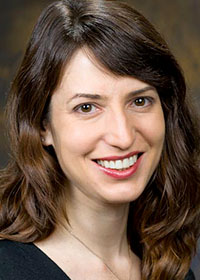Sadie Wignall, PhD
Professor, Molecular Biosciences; Judd A. and Marjorie Weinberg College of Arts and Sciences

Research Program
Cancer-Focused Research
Proper segregation of chromosomes during mitosis and meiosis depends upon the formation of a bipolar spindle. In most cell types, duplicated centrosomes contribute to spindle assembly by nucleating microtubules and helping to organize the two poles. However, during meiosis in female animals the centrosomes are degraded prior to the meiotic divisions, and therefore oocyte spindles form in their absence. We are interested in understanding how these acentrosomal spindles form, how they are organized, and how they promote proper chromosome partitioning. To address these questions, we combine high-resolution microscopy with genetic, genomic, and biochemical approaches in the nematode C. elegans. Since cancer cells exploit analogous mechanisms to achieve uncontrolled growth during tumor formation, these studies will reveal proteins and pathways that could be targeted to prevent tumor progression.
